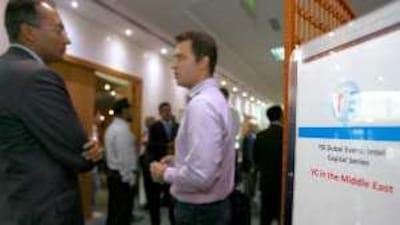The high cost of launching a business in the UAE is holding back innovative start-ups that could help advance the country's small business sector, says one of the region's leading venture capitalists. Feroz Sanaulla, the regional executive director of Intel Capital - the venture capital arm of Intel, the chip maker - believes a lack of experienced senior managers, the absence of proper corporate governance rules and arcane bankruptcy laws have contributed to the dearth of entrepreneurs in the country.
But all of these problems, Mr Sanaulla added, are dwarfed by the high cost of launching a new business. "The problem that I'm seeing is the cost of doing business here is too high," Mr Sanaulla said. Structurally, the UAE is not ready to be a knowledge hub." Entrepreneurs say it costs upwards of Dh50,000 (US$13,612) to buy a licence to operate in the Dubai Internet City free zone, where Mr Sanaulla spoke before a crowd of vociferous local entrepreneurs this week. Mishaal al Gergawi, an Emirati, received loud applause after suggesting that if Dubai wants to encourage entrepreneurship, the emirate should lower licence costs by 70 per cent. "There was a time when Dubai was entrepreneurial," said Mr al Gergawi. "But what do we do? We increase fees every day. Nowhere else in the world can you increase fees to stimulate entrepreneurs."
Jimmy Grewal, the owner of Pulse, a technology company that remotely monitors home energy usage, said the country still had a chance to improve how small businesses could grow and thrive. "Dubai still has a lot going for it," Mr Grewal said. "It still has a unique mix of cultures and in some places it's still cost-effective, but unless the climate improves, I think by the end of this year the few entrepreneurs that are left here, if they aren't successful, they'll leave."
There are about 80,000 Dubai businesses in the small to medium-sized enterprise (SME) category, or 98.5 per cent of the entire Dubai business community. Recent government figures have shown SMEs account for about 85 per cent of all jobs in the UAE and contribute 46 per cent of its GDP. Encouraging entrepreneurs has been a main plank of Dubai and Abu Dhabi's plans for the future, and some work has recently been done in government agencies to improve the climate for small businesses.
The Mohammed Bin Rashid Establishment for SME Development, an arm of the Dubai Government, recently announced the official definition of what constitutes micro, small and medium-sized businesses based on employee numbers, annual turnover and industry classifications - an initiative aimed at improving relations with banks and other lenders. TechnoPark, a free zone in Jebel Ali, is currently negotiating with several technology companies such as IBM, Intel and Nokia to develop research and development ventures in a planned research park by 2015.
But any work improving the environment for small businesses may be too late, Mr Sanaulla said. Venture capitalists say Dubai has "months, not years" to create the right tools to help nurture innovative ideas. "We're bringing knowledge here, but we're not developing the knowledge. A knowledge economy happens at the ground," Mr Sanaulla said. Still, there were flashes of optimism at the meeting. Mohammed Alzubi, a director at the technology investment group of Dubai Silicon Oasis Authority, said the free zone was developing a global technology fund expected to officially announce its initial investments later this year.
"It's a great time to be in the Middle East. There's a lot of initiatives in Dubai that are helping small businesses," he said. "Things are getting better, they're not getting worse." Intel Capital has been one of the more active venture capital companies in the region, with eight investments including Pulse, ShooFeeTV and Sphere Networks, with a total investment budget of about $50 million. dgeorgecosh@thenational.ae

High costs holding back start-ups
The high cost of launching a business in the UAE is holding back innovative start-ups that could help advance the country's small business sector, says one of the region's leading venture capitalists.
Most popular today
